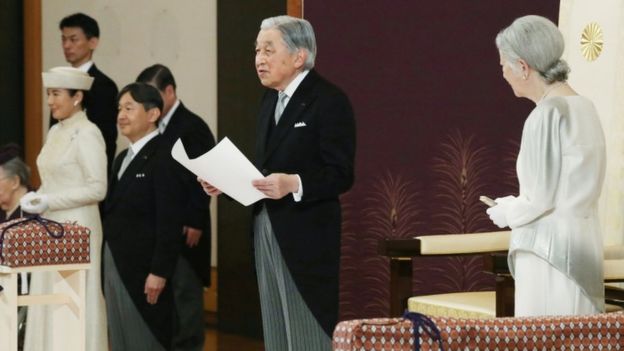
Japanese Emperor Akihito declares historic abdication
Japan's Emperor Akihito has declared his abdication in a historic ceremony at the Imperial Palace in Tokyo.
In his last public address as emperor, Akihito handed over the symbols of power and thanked the public for their support during his 30-year reign.
Advertisement
The 85-year-old was given permission to abdicate after saying he felt unable to fulfil his role because of his age and declining health.
He is the first Japanese monarch to stand down in more than 200 years.
Crown Prince Naruhito will ascend the throne on Wednesday, beginning a new era - called Reiwa - in Japan's unique calendar.
While the emperor holds no political power, he serves as a national figurehead.
Akihito's reign has been marked by his interactions with people suffering from disease and disaster, which have endeared him to many Japanese people.
What happened at the abdication ceremony?
In the morning, the emperor took part in a Shinto ceremony to report his plans to the mythological ancestors of Japan's imperial family.
The main "Ceremony of the Abdication" took place in a state room of the Imperial Palace in front of about 300 people including Prime Minister Shinzo Abe, Crown Prince Naruhito, and Crown Princess Masako.
Imperial chamberlains carried the state and privy seals into the hall, along with a sacred sword and a jewel which are considered symbols of the imperial family.
In a short ceremony, Prime Minister Shinzo Abe addressed the emperor, saying: "While keeping in our hearts the path that the emperor has walked, we will make utmost efforts to create a bright future for a proud Japan that is full of peace and hope."
Then in his final speech Akihito, wearing a Western-style morning coat, said he "wished Japan and the world peace and prosperity".
"I am deeply grateful for the people that accepted me as a symbol and supported me," he said.
"Along with the empress consort, I hope from my heart the Reiwa era will be peaceful and fruitful, and I hereby pray for the well-being and happiness of our country and people of the world."
After helping his wife, Empress Michiko, down the steps of the ceremonial platform, the emperor bowed towards the gathered officials then left the room.
He will technically remain emperor until midnight.
On Wednesday morning, Crown Prince Naruhito will inherit the Imperial Treasures and assume the throne.
Why did the emperor decide to abdicate?
The 85-year-old had surgery for prostate cancer in 2003 and a heart bypass operation in 2012.
In a rare speech in 2016, he said that he feared his age would make it hard for him to carry out his duties and strongly hinted that he wanted to stand down.
Opinion polls showed that the vast majority of Japan sympathised with the emperor and a year later parliament enacted a law that made his abdication possible.
Who is the incoming emperor?
Prince Naruhito will become Japan's 126th emperor - and will officially lead the country into the new Reiwa era. It will mark the end of the current Heisei era, which began when Akihito ascended the throne in 1989.
The 59-year-old Oxford University graduate is married to Crown Princess Masako. Their only child, Princess Aiko, was born in 2001.
Japan's current law prohibits women from inheriting the throne so Princess Aiko's uncle Prince Fumihito is now first in line, followed by her cousin, 12-year-old Prince Hisahito.



